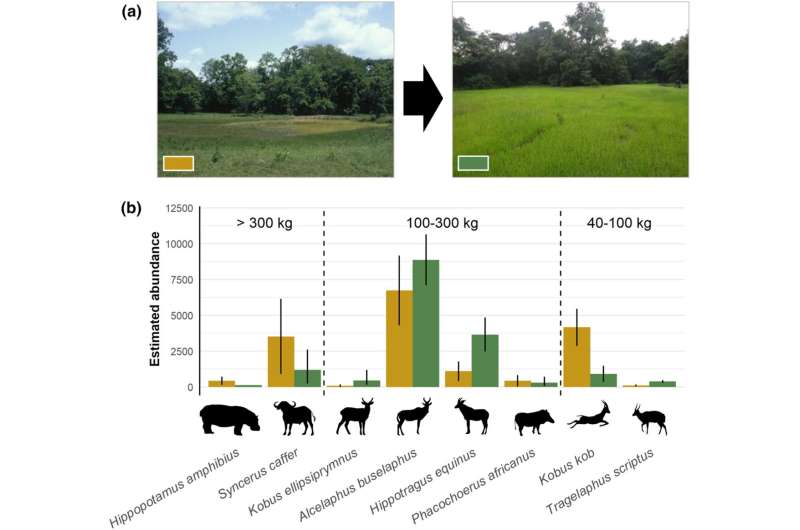War disturbs nature permanently, study finds

Using long-term data, researchers studied the effects of large mammal declines—caused by civil war and poaching—on the species composition of savanna ponds. Guillaume Demare conducted the research as part of his doctoral studies at the Museum für Naturkunde Berlin and Freie Universität, and the study is published in Global Change Biology.
The research team found that pond habitat changes, likely triggered by the loss of large-bodied herbivores, resulted in significant species shifts within these small freshwater ecosystems. This shows once again how strongly different ecosystems are interconnected, what far-reaching consequences the disappearance of species has and how war disturbs nature in the long term.
This study, which focused on the savanna amphibians of Comoé National Park in northern Ivory Coast, West Africa, was made possible because data was collected both before and after ecosystem changes took place.
"Collecting data on the state of ecosystems, both past and present, is absolutely essential if we are to understand complex ecological effects in our changing world," says Dr. Mark-Oliver Rödel, researcher at the Museum für Naturkunde Berlin.
Three of the authors researched the amphibian communities of ponds in Comoé National Park in the 1990s. About 10 years later, a civil war broke out in Ivory Coast, and during this time the park was left unprotected. Poaching, which had already been a huge pressure to the region's large mammals, intensified to such an extent that Comoé National Park was declared a World Heritage Site in Danger by the UNESCO.
When Dr. Rödel and his colleague Dr. Marko Spieler returned to the area in 2014, they noticed that the savanna ecosystem had gone through dramatic changes. Vegetation seemed to have increased massively throughout the park, including the ponds which had been sampled 20 years earlier.
"There is very little doubt that these vegetation changes were caused by the loss of large herbivores, such as hippos and buffalos," explains Guillaume Demare. "These large-bodied animals are often referred to as 'ecosystem engineers' because their activities shape entire ecosystems."
The effects of large-bodied herbivores on savanna vegetation have been known from previous research. However, the Museum für Naturkunde Berlin-led team was the first to investigate their impact on small temporary water bodies, which are heavily utilized by large mammals for drinking and mud-bathing.
"Small temporary ponds are poorly studied ecosystem components, and yet many species rely on them for reproduction," says Guillaume Demare. "Habitat changes such as the dramatic vegetation increase that we measured were accompanied by significant shifts in the species found within them: some became more common, while others declined or disappeared."
Among the species that became more common are Hemisus marmoratus and Afrixalus spp., and among those that declined are Ptychadena spp. Frogs of the genus Afrixalus are also known as leaf-folding reed frogs, so they benefit from increased vegetation for laying their eggs. In contrast, some species of the genus Ptychadena prefer ponds with little or no vegetation. Consequently the Ptychadena populations declined.
The results from this research represent an important step in better understanding the many ways in which declining large mammals may influence both terrestrial and adjacent aquatic ecosystems. "In addition, most species found in small ephemeral ponds also have a terrestrial adult life stage, so they create possibly crucial ecological links between land and water," says Guillaume Demare. "The next step in our line of research is to further elucidate how important small water bodies are for the functioning of both aquatic and terrestrial ecosystems."
More information: Guillaume Demare et al, Savanna vegetation increase triggers freshwater community shifts, Global Change Biology (2022). DOI: 10.1111/gcb.16423
Journal information: Global Change Biology
Provided by Leibniz-Institut für Evolutions- und Biodiversitätsforschung


















